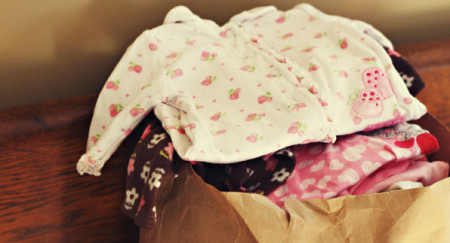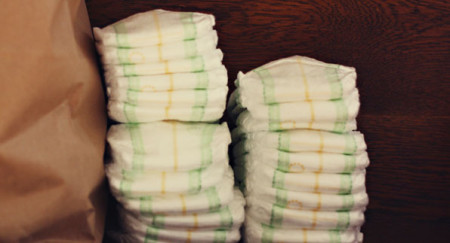If you stopped by my church this Sunday, you might have seen moms with one hand grasping a wiggly toddler and in the other hand, a plastic bag. That bag might have infant boy shoes and hats, frilly pink 3T sundresses, or maybe some gender-neutral onesies. There are lots of reasons I love my church, but the plastic bags might be one of the easiest ways to know we have a real community going on here.

All photos by Rebecca Tredway Photography
I remember being on the receiving end of those plastic bags a couple years ago when we were blessed with the unexpected placement of a foster daughter. We were given clothes and toys in mysterious shades of pink and purple that had never before entered our home of little boys. We watched our community rally around us with emotional support and love for this little girl who had found her life turned upside down for reasons she was much too young to understand. While she will never remember those who offered her help in her vulnerable days, we will never forget how we saw the church become Jesus to her and to us. We now find so much joy in offering that love and support to others when they find themselves in need, whether that’s with the unexpected arrival of foster children, or the much anticipated joy of the birth of a baby into our church family. We love bringing our own plastic bags of what we can spare to help make life a little easier.
Before I hand off these bags, I have found myself asking the mom, “Are you okay with hand-me-downs?” Of course people have different feelings about second-hand clothes and supplies, but I think what I’m really asking is, “Do you need help?” It’s a simple enough question and those of us who have been in the trenches of parenthood know, we DO need help. We need a LOT of help, but it can be harder than we expect to accept what’s offered out to us.
A plastic bag of cast-off clothes can be a pretty easy way to offer help and the simple act of taking it may not make us feel humiliated, but what about when our needs become more serious? I take a lot of pride in being a self-sufficient person. A lot of us moms do. But sometimes God reminds us that we aren’t nearly as self-sufficient as we think we are. And even if we were, it might not be a good thing.
I was thinking about this a couple weeks ago when my friend’s fourth baby was born prematurely and was headed for a stay in the Neonatal Intensive Care Unit. How could she balance her c-section recovery, the needs of her other young children, and the care of this new baby who had some serious obstacles to overcome before he was ready to come home? This is a friend who helped me when my own baby was born by bringing food, a gift and talking me through my difficult recovery, but when help was offered to her from many directions, she responded like most of us—we don’t WANT to need help. We feel our families are our responsibility, so how can we admit we can’t do this on our own? What kind of weakling would that make us? We consider what it might do to our reputation and our dignity, but we don’t often consider by refusing to allow other people to minister to us in our time of need, we may have refused them the opportunity to do what God has created them to do.
A few days later I was talking with a friend who is struggling financially. She told me about the guilt she experienced while eating a tortilla for lunch because she worried maybe her kids weren’t getting enough to eat and might be hungry for it later. With a mixture of laughter and tears she talked about what a growing experience it has been for her to understand God intends to meet their needs in ways she can’t yet anticipate. She wanted to turn down the offers of help from friends, but Scripture makes it pretty clear we can’t see the tears of sisters and say, “Go in peace; keep warm and well fed” when we have something we can do to help. And how many times had we all benefitted from her gifts of insight, discernment and encouragement as part of our community? She may have benefitted financially in this situation, but we know the blessings that come to those who hear and obey God’s call to help in whatever capacity they can.
It used to be easy for me to help others and see the value in it, but I felt like such a burden if I needed help myself. I struggle with thinking refusing help is an indication of my strength, but I am coming to learn it may be more of an indication of my stubbornness, my weakness even, and my desire to not need anybody. By refusing help, I am refusing community and refusing the scary position of being dependent. When I turn down offers of help I may be doing it because I think somebody feels sorry for me and is acting out of obligation or pity. What I don’t often consider is that by offering me help, somebody may be obeying God. They may be acting in faith and expressing their God-given gifts, but all I can see is the guilt I might feel if I let somebody in.
I should have known with this kind of thought pattern, I was begging to be humbled.
For me, it happened with the birth of a fourth baby (when my oldest was just five) and a complicated c-section recovery. And after a couple days off my husband had to go back to work. And then I got the flu. Whatever semblance of dignity and pride I was trying to hold together went out the window about the time I answered the door still in my pajamas, totally pale and with evidence of my violent illness still stuck to my hair. That was when a casual acquaintance became Jesus in the flesh with a bag of groceries and some encouraging words.
A couple days later a friend dropped off a loaf of bread and cookies for the kids. Then I got an email from an experienced mom telling me she WAS coming over and when she got there I was to just tell her what needed to be done and leave her to it. My floors have never looked so clean and I felt so loved. Meals came long after the specified time period the church had planned for us as people obeyed God’s call to care for a family that was struggling.

I wish I could tell this story from the perspective of one of those wonderful women who became some tangible example of Jesus to our family, but that’s not where God had me. God needed me to be humbled and to allow women to use their gifts to love me and to set a foundation for my ability to trust them with not just my physical needs, but also my emotional and spiritual struggles, too. Their acts of help brought us into community beyond the mere lip-service that was easy to do in book clubs and discussion groups. When you’ve cleaned the sizable dust-bunnies out from under my bookshelf, we are bonded for life.
It has been a blessing to see the church family we are invested in show its tangible love and support through the simple things like the weekly exchange of second-hand clothes and also in the big moments of home remodeling projects for those who can’t do it for themselves. These are the ways we create community and a healthy interdependence. But as I’m expressing thanks for those who have invested themselves in the good work of helping their neighbors, I also want to be thankful for those who have realized their limits and humbled themselves to allow The Body of Christ to function as a literal body. We know Jesus said, “It is more blessed to give than to receive” and we all long to be givers, but sometimes we deny others the blessings of offering their gifts by pretending we don’t have needs.
Let’s learn to be honest about our struggles and to give selflessly when we hear about the struggles of others. Let’s lay down the pride of self-sufficiency and acknowledge our need for our God and for each other. And when somebody offers you a plastic bag of baby clothes, just take it.
